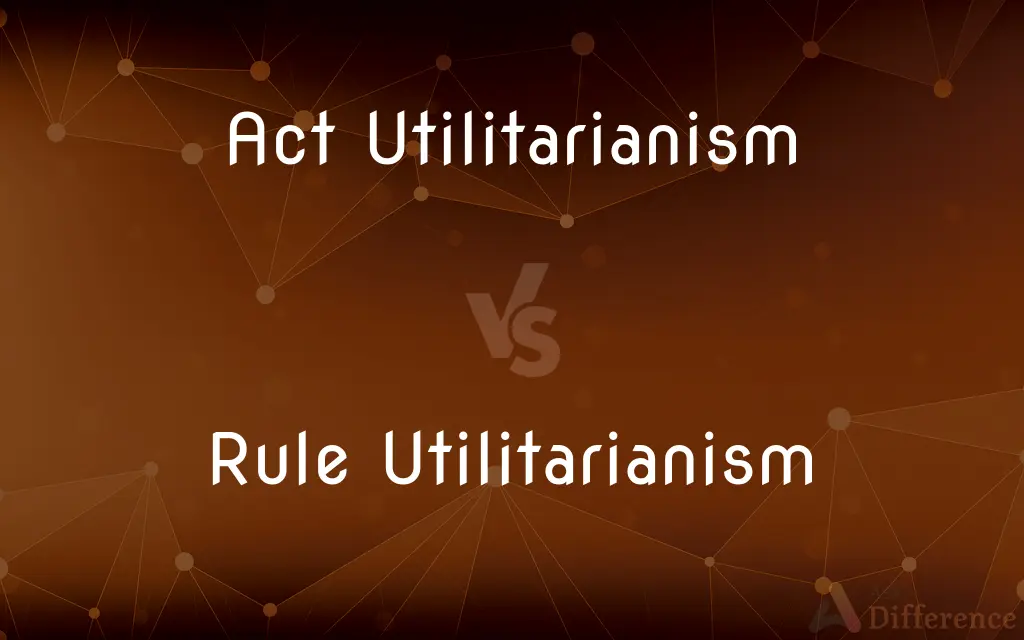Act Utilitarianism vs. Rule Utilitarianism — What's the Difference?
By Tayyaba Rehman — Published on December 22, 2023
Act Utilitarianism judges an action based on its individual outcomes, while Rule Utilitarianism determines an action's morality by its adherence to generalized beneficial rules.

Difference Between Act Utilitarianism and Rule Utilitarianism
Table of Contents
ADVERTISEMENT
Key Differences
Act Utilitarianism is a consequentialist theory that evaluates the moral worth of an action based on the specific consequences it produces. In this perspective, an act is morally right if it results in the greatest good for the greatest number of people. Rule Utilitarianism, on the other hand, is less concerned with individual acts and more with the rules governing actions. It posits that an action is right if it conforms to a rule that, if universally followed, would produce the most happiness overall.
Act Utilitarianism allows for more flexibility as it assesses each situation independently. Decisions are made after considering the specific outcomes of an action, taking into account the unique circumstances. Rule Utilitarianism, in contrast, demands consistency by emphasizing the establishment of general rules that should be followed in all situations to ensure the greatest overall happiness.
When considering a moral dilemma, Act Utilitarianism would prompt one to weigh the specific outcomes of each potential action in that particular situation. If lying, for example, would lead to more happiness in a given situation, Act Utilitarianism might deem it appropriate. Rule Utilitarianism would look at lying differently. If lying, as a general rule, tends to decrease overall happiness, then lying would be considered wrong, regardless of the specific scenario.
At the heart of Act Utilitarianism is a focus on individual actions and their immediate consequences. It is inherently situational, allowing for actions that might be deemed wrong in one context to be right in another if they produce more happiness. Rule Utilitarianism, meanwhile, is about consistency and the long-term consequences of adhering to specific rules. It emphasizes the creation and observance of rules that, when generally applied, maximize happiness and well-being.
Comparison Chart
Basis of Judgment
Individual actions' outcomes
Adherence to beneficial rules
ADVERTISEMENT
Flexibility
High (evaluates each situation individually)
Low (follows established rules)
Primary Focus
Specific consequences of actions
General consequences of rules
Example Scenario
Lying might be right if it maximizes happiness
Lying is wrong if the rule against it generally maximizes happiness
Long-term View
Less emphasis on long-term consequences
Emphasizes long-term outcomes of rule adherence
Compare with Definitions
Act Utilitarianism
A theory that assesses actions based on their specific outcomes.
Using Act Utilitarianism, he determined that sharing the secret would create more happiness.
Rule Utilitarianism
Determines morality based on adherence to beneficial rules.
According to Rule Utilitarianism, the act was wrong since it broke an overall beneficial rule.
Act Utilitarianism
Operates without rigidly set rules, assessing each scenario on its own.
Although it seemed counterintuitive, Act Utilitarianism deemed the act permissible due to its unique context.
Rule Utilitarianism
Values consistency in moral judgments based on rules.
Despite the tempting short-term gains, Rule Utilitarianism advised against the action.
Act Utilitarianism
Considers each situation individually for moral judgment.
Act Utilitarianism led her to break the rule, seeing a net positive outcome.
Rule Utilitarianism
Considers the long-term outcomes of universally following rules.
Considering Rule Utilitarianism, they realized that allowing such behavior could have detrimental effects in the long run.
Act Utilitarianism
Focuses on the consequences of individual actions.
Act Utilitarianism justified his choice to go against convention for the greater good.
Rule Utilitarianism
A theory focused on the broader consequences of adhering to specific rules.
Rule Utilitarianism supports always telling the truth, believing it leads to greater overall happiness.
Act Utilitarianism
A form of consequentialism emphasizing the greatest good for the most people.
Donate the money.
Rule Utilitarianism
Emphasizes the establishment of general rules for actions.
Rule Utilitarianism prompted the community to create guidelines that would benefit all.
Common Curiosities
What does Act Utilitarianism focus on?
Act Utilitarianism focuses on the specific consequences of individual actions.
Does Rule Utilitarianism allow for exceptions to its rules?
Typically, no. Rule Utilitarianism emphasizes adhering to rules that maximize overall happiness when universally applied.
How does Rule Utilitarianism determine an action's morality?
Rule Utilitarianism determines morality based on whether an action adheres to beneficial rules that maximize overall happiness.
How does Rule Utilitarianism view individual actions?
Rule Utilitarianism views individual actions in light of established rules that are believed to maximize overall happiness.
Is Act Utilitarianism a form of consequentialism?
Yes, Act Utilitarianism is a form of consequentialism as it evaluates actions based on their outcomes.
Can Rule Utilitarianism support breaking a rule in certain situations?
Typically, no. The theory emphasizes following rules that, when generally applied, maximize happiness.
Which is more flexible, Act Utilitarianism or Rule Utilitarianism?
Act Utilitarianism is more flexible as it assesses each situation independently.
How does Act Utilitarianism handle unique moral dilemmas?
Act Utilitarianism assesses each unique moral dilemma independently, considering the specific consequences.
Can Act Utilitarianism ever justify lying?
Yes, Act Utilitarianism can justify lying if it results in the greatest overall happiness in a specific situation.
Do both Act and Rule Utilitarianism aim for the greatest happiness?
Yes, both aim for the greatest happiness, but their methods of assessment differ.
Does Act Utilitarianism have established rules like Rule Utilitarianism?
No, Act Utilitarianism operates without rigidly set rules, assessing each scenario on its merits.
Does Rule Utilitarianism consider long-term consequences?
Yes, Rule Utilitarianism emphasizes the long-term outcomes of adhering to specific rules.
Can the same action be judged differently under Act and Rule Utilitarianism?
Yes, an action might be permissible under Act Utilitarianism due to specific outcomes but impermissible under Rule Utilitarianism if it violates a beneficial rule.
Is Rule Utilitarianism more consistent in its judgments?
Generally, yes. Rule Utilitarianism's emphasis on established rules leads to more consistent moral judgments.
Share Your Discovery

Previous Comparison
Ammonia vs. Ammonium Hydroxide
Next Comparison
Magnesium vs. Magnesium OxideAuthor Spotlight
Written by
Tayyaba RehmanTayyaba Rehman is a distinguished writer, currently serving as a primary contributor to askdifference.com. As a researcher in semantics and etymology, Tayyaba's passion for the complexity of languages and their distinctions has found a perfect home on the platform. Tayyaba delves into the intricacies of language, distinguishing between commonly confused words and phrases, thereby providing clarity for readers worldwide.













































